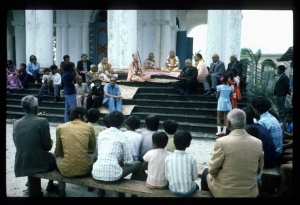CC Antya 11.20 (1975): Difference between revisions
(Vanibot #0027: CCMirror - Mirror CC's 1996 edition to form a basis for 1975) |
(Vanibot #0020: VersionCompareLinker - added a link to the Version Compare feature) |
||
| Line 2: | Line 2: | ||
<div style="float:left">'''[[Sri Caitanya-caritamrta (1975)|Śrī Caitanya-caritāmṛta (1975)]] - [[CC Antya (1975)|Antya-līlā]] - [[CC Antya 11 (1975)|Chapter 11: The Passing of Haridāsa Ṭhākura]]'''</div> | <div style="float:left">'''[[Sri Caitanya-caritamrta (1975)|Śrī Caitanya-caritāmṛta (1975)]] - [[CC Antya (1975)|Antya-līlā]] - [[CC Antya 11 (1975)|Chapter 11: The Passing of Haridāsa Ṭhākura]]'''</div> | ||
<div style="float:right">[[File:Go-previous.png|link=CC Antya 11.19 (1975)|Antya-līlā 11.19]] '''[[CC Antya 11.19 (1975)|Antya-līlā 11.19]] - [[CC Antya 11.21 (1975)|Antya-līlā 11.21]]''' [[File:Go-next.png|link=CC Antya 11.21 (1975)|Antya-līlā 11.21]]</div> | <div style="float:right">[[File:Go-previous.png|link=CC Antya 11.19 (1975)|Antya-līlā 11.19]] '''[[CC Antya 11.19 (1975)|Antya-līlā 11.19]] - [[CC Antya 11.21 (1975)|Antya-līlā 11.21]]''' [[File:Go-next.png|link=CC Antya 11.21 (1975)|Antya-līlā 11.21]]</div> | ||
{{CompareVersions|CC|Antya 11.20|CC 1975|CC 1996}} | |||
{{RandomImage}} | {{RandomImage}} | ||
==== TEXT 20 ==== | ==== TEXT 20 ==== | ||
<div class="verse"> | <div class="verse"> | ||
:eta | :eta bali' mahā-prasāda karilā vandana | ||
:eka rañca lañā tāra karilā bhakṣaṇa | :eka rañca lañā tāra karilā bhakṣaṇa | ||
</div> | </div> | ||
| Line 18: | Line 17: | ||
<div class="synonyms"> | <div class="synonyms"> | ||
eta | eta bali'-saying this; mahā-prasāda—to the mahā-prasāda; karilā vandana—he offered respect; eka rañca—one fractional part; lañā—taking; tāra karilā bhakṣaṇa—ate it. | ||
</div> | </div> | ||
| Line 25: | Line 24: | ||
<div class="translation"> | <div class="translation"> | ||
Saying this, he offered prayers to the mahā- | Saying this, he offered prayers to the mahā-prasāda, took a little portion, and ate it. | ||
</div> | </div> | ||
| Line 32: | Line 31: | ||
<div class="purport"> | <div class="purport"> | ||
Mahā- | Mahā-prasāda is nondifferent from Kṛṣṇa. Therefore, instead of eating mahā-prasāda, one should honor it. It is said here, karilā vandana, "he offered prayers." When taking mahā-prasāda, one should not consider the food ordinary preparations. Prasāda means favor. One should consider mahā-prasāda a favor of Kṛṣṇa. As stated by Śrīla Bhaktivinoda Ṭhākura, kṛṣṇa baḍa dayāmaya karibāre jihvā jaya svaprasāda-anna dilā bhāi. Kṛṣṇa is very kind. In this material world we are all very attached to tasting various types of food. Therefore, Kṛṣṇa eats many nice varieties of food and offers the food back to the devotees, so that not only are one's demands for various tastes satisfied, but by eating prasāda he makes advancement in spiritual life. Therefore, we should never consider ordinary food on an equal level with mahā-prasāda. | ||
</div> | </div> | ||
Latest revision as of 21:07, 26 January 2020

A.C. Bhaktivedanta Swami Prabhupada
TEXT 20
- eta bali' mahā-prasāda karilā vandana
- eka rañca lañā tāra karilā bhakṣaṇa
SYNONYMS
eta bali'-saying this; mahā-prasāda—to the mahā-prasāda; karilā vandana—he offered respect; eka rañca—one fractional part; lañā—taking; tāra karilā bhakṣaṇa—ate it.
TRANSLATION
Saying this, he offered prayers to the mahā-prasāda, took a little portion, and ate it.
PURPORT
Mahā-prasāda is nondifferent from Kṛṣṇa. Therefore, instead of eating mahā-prasāda, one should honor it. It is said here, karilā vandana, "he offered prayers." When taking mahā-prasāda, one should not consider the food ordinary preparations. Prasāda means favor. One should consider mahā-prasāda a favor of Kṛṣṇa. As stated by Śrīla Bhaktivinoda Ṭhākura, kṛṣṇa baḍa dayāmaya karibāre jihvā jaya svaprasāda-anna dilā bhāi. Kṛṣṇa is very kind. In this material world we are all very attached to tasting various types of food. Therefore, Kṛṣṇa eats many nice varieties of food and offers the food back to the devotees, so that not only are one's demands for various tastes satisfied, but by eating prasāda he makes advancement in spiritual life. Therefore, we should never consider ordinary food on an equal level with mahā-prasāda.